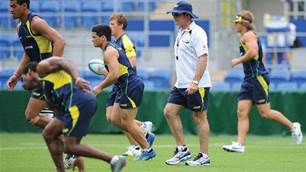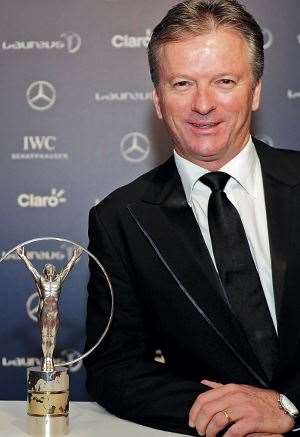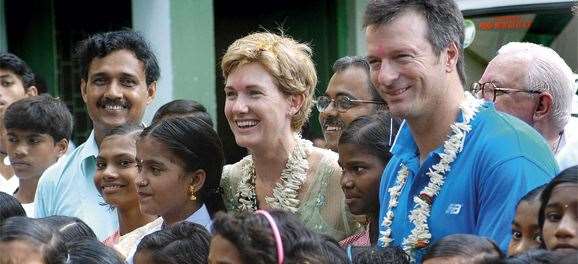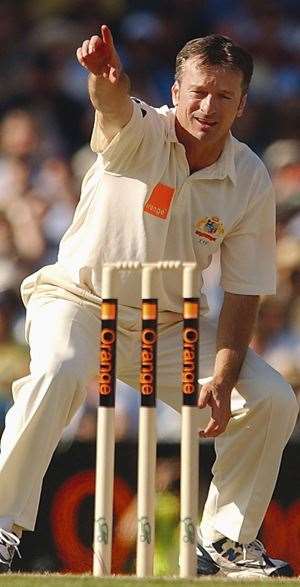The figures say he was the greatest Test captain of all. Yes, he presided over a team so great at its best, on so many levels, it’s difficult to imagine anyone beating them, but he was the logical man to lead them.
The figures say he was the greatest Test captain of all. Yes, he presided over a team so great at its best, on so many levels, it’s difficult to imagine anyone beating them, but he was the logical man to lead them. He was also a batsman figures would never do justice to: there’s plenty to be said about the way he evolved from young all-rounder holding a precarious place in the Australian team to a true batting hero, who scored his 29 Test centuries under all conditions against all attacks. After a faltering start, he spent 14 years tormenting the Poms like no one since Bradman, and he’s shifted into another dimension entirely since he retired, witnessing and enduring hardships that made a spell from Ambrose on a juiced-up pitch seem like Play School. Unfortunately, he has loud detractors. But the weight of Australia’s opinion is against them. Steve Waugh speaks to Inside Sport.
You seem a completely different bloke since you last played cricket. What’s that all about?
Well, a lot’s happened since then. It only takes a few things to happen and you start to see the world very differently. Things like statistics and accolades are meaningless if you haven’t got the people you love, and your health.
Is that what your new book The Meaning Of Luck is all about? It seems in there that you appreciate life on a whole new level of existence.
Well, things changed pretty drastically in 2006 when my wife, Lynette, had a stroke. When I first heard, I was a long way away, in Geelong, and on the trip back I felt more alone and helpless than I’d ever felt. That plane trip was very hard. I had demons. I had [brain surgeon] Charlie Teo’s words bouncing around in my head: “You have to prepare yourself for the worst-case scenario.” Lynette did survive, and now she’s about 98 per cent back to what she was. All that became the catalyst for this book. Lynette called the whole thing her “stroke of luck”, because she was lucky enough to survive it, and her whole view of life became different.
So I made that the opening chapter. It sort’ve set the tone for the whole thing. It was easy to choose what to write, because I’ve met so many people over such a long period of time, and from all walks of life, and as with everyone, luck played a part in their lives, and it seemed that what they did with that luck was what set them apart. So I did a series of short chapters on that idea.
I’ve had a lot of opportunities to meet people who have been successful – and some have overcome a lot – in the fields of philanthropy and business, as well as sport. Being athlete liaison officer at the last Olympics meant I met and mingled with a great range of very successful athletes and other people in other walks of life. All these things led me to ask a lot of questions about luck, like whether it’s just chance, and what good and bad luck actually means.
In sport, Steven Bradbury probably is an example of how people see luck. Sure, what happened at the very end when he won the gold medal was fortunate for him. But he was a person with a dream, which he had since he was a kid. He made a lot of sacrifices to achieve it and overcame some hardships. He let nothing get in his way. The luck was the result of good planning and hard work – otherwise he wouldn’t have even been there, in that position, in the first place.
Your career would suggest that a lot of your attitude toward luck is about ... well, attitude.
Well, when you turn bad luck around, that really happens because of attitude. Opportunities present themselves. Sometimes they’re obvious and sometimes not. Whether you see them and grab them depends on attitude. I found in my career that sometimes I had to do something I hated doing at the time in order to succeed ...
What was that?
Fail! I’m really grateful now for the early failures in my career. It taught me how to overcome self-doubt. Failure gave me something I never wanted to go back to once we started winning. It also showed me what being unsuccessful was all about. It dawns on you that if you get what you want – if you’re always successful – you haven’t got the means to deal with being unsuccessful when it comes around. As captain, it meant that I could recognise when we were getting off track, or dealing with our success badly – complacently, or maybe getting a bit carried away with it.
Maybe the Australian public could learn something from that as well. When we had a successful team, there was a lot of whining, and I don’t think it was all justified, when I look at the behaviour of other teams over the years ...
Ha ha! Well, when we won eight Ashes series in a row, they were great team wins. And I know we won one series after about 11 days’ play or something. When you look at it now, we took winning Test matches for granted.
Now we’ve lost three of the last four series ...
At the time, a lot of people were saying it was boring because we were winning too easily, but it was our job to win as easily as we could, and that’s what I really wanted to keep emphasising.
So, those failures you’re grateful for. Tell us about those ...
Despite the popular perception, I was a dasher when I was young. I’d be looking to score off every ball and wasn’t a fan of defending. When I came into the NSW team, I got a lot of praise from people like Bill O’Reilly, who called me the next McCabe. I was being compared to Doug Walters. But these were other people’s expectations. You might look good while you’re out there, but then you’re spending the rest of the day watching everyone else bat. I was forced to modify my game and play in a way that suited me, made the bowlers bowl at me, so that I was the one dictating.
Bob Simpson was very good, and watching people like Allan Border play, I sort of worked it out. Then when I became successful I thought “this really works”, and at the top level it’s about consistency and longevity, and I basically worked out a formula that worked for me and decided to stick with it. Getting dropped from the Australian Test side and realising I had to do things differently and more professionally to be better is something I’m glad happened.
Even though you lost your spot to your brother Mark?
That wasn’t a problem. I got back, that’s the important thing. Being born a twin is a big thing, though. It made you competitive and you stood out. That gave us that competitive hard streak. We relied on each other and probably got more opportunities because we were twins.
The book seems to say a lot about another, even bigger topic, and this might surprise anyone who thought they knew you – not because you’re incapable of it, but because it just wasn’t the sort of thing you’d necessarily have conversations about. I’m talking about love.
That’s probably best exemplified in the chapter on Lynette and the family and what we went through. I think when Lynette was really sick and there was a possibility that she may pass away when I got the news, everything else was in the background – wealth, possessions, records, statistics, accolades, letters next to your name, it’s all irrelevant. How can your wife and family stay together and get better? That to me was a really strong example of life and what it all means. Sometimes we do get carried away, and we all get materialistic and that’s okay. It’s good to have aspirations and dreams, but your health is the number-one thing. If you haven’t got that, you really haven’t got anything. Health and family go together, so that really did put it in perspective.
That changed life and for a couple of years everything got put on the backburner. All my business projects, all the things I was doing outside family life were pushed aside and I just focussed on how we could get Lynette better, and get back to being a normal family. You don’t realise what a big hole it puts in your family life when you realise you haven’t got a mother doing the stuff you take for granted every day. For me, I became Mister Mum for a while, and you realise the things you take for granted are, in fact, very significant things.
You played for and against a lot of people. Who really stands out as someone you admire?
Curtly Ambrose.
What? You mean the bloke you nearly came to blows with?
He was always an opponent I respected. He was the ultimate professional. From ball one to the last ball, his effort was the same the whole time. He bowled this incredible length, and he was always at you with a short ball. He has an intimidating presence. He had skill. He had stamina. He had resilience. He had courage. If I had to pick one player for my side, I’d pick him.
Was beating the Poms really the ultimate, or was beating the West Indies, or India at home?
The 1995 win in the West Indies was the ultimate victory. We hadn’t beaten them for 20 years. They were unbeaten for 15 years.
If we were the number-one side, we wanted to beat the number-two side. If we were number-two, we wanted to beat number-one. But the Ashes have special significance. I’ve been around long enough to remember what it was like losing to England.
What’s your all-time favourite Ashes series you played in?
The 1989 series stands out. It was the best tour I’ve been on. We all clicked together and suddenly emerged as a team. It was a great win against a pretty good side.
What was your best effort against them?
That 157 at The Oval with a leg injury was one, because I’d given up on the idea of playing, and even when I went through three weeks of torture to get out there, I didn’t think I’d make it. It was Lynette who pushed me harder and told me I was staying there to play the Test, and Errol Alcott, the physio, who got me up and out there.
What else do you look back on with some pride?
That last-ball century in Sydney was an amazing experience. The 1999 World Cup, with seven wins on the trot. I had to swallow my pride and change some things there, recognise I made a mistake. Ashes-wise, career-wise, there are hundreds of moments.
You seem to have some high-profile critics who are pretty persistent, like Ian Chappell and Shane Warne. Do you feel misunderstood?
I don’t know what the opinion is half the time, and I’ve sort of gone past the stage of caring. I hear a lot of stuff and I think “That’s way over the top. I wasn’t as good as that.” And I hear other stuff and think, “Hang on, you don’t know me. That’s not right, either.” I’ve had a few detractors who have been consistent and no matter what I do they’d always be negative. I’m pretty happy with what I did and the way I went about it. I always had the team at the forefront of every decision I made: how can we get better and how can we win this game? That was my number-one priority. And for the players it was: how can I get the most out of their potential and can we get them to improve? I don’t expect everyone to think I was fantastic or agree with what I did.
Is this book, and the charity work, more of an insight into who you are?
Well, the charity work is about making a difference and actually seeing outcomes that are positive in real lives. Those sorts of results make everything else seem trivial. I think this book is more of an insight into what I really am. As a cricketer, once you’re pigeon-holed, it’s hard for people to think of you in any different way. I think this book is probably the real me compared to what you see and hear.
Related Articles
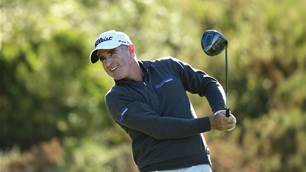
Video interview: Drinks With ... Matt Millar
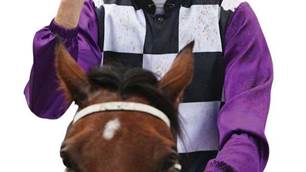
A few drinks with jockey Hugh Bowman
